Malaysia Today - Your Source of Independent News |
| When ‘Hang Tuah’ became ‘Hang Jebat’ Posted: 23 Sep 2011 05:29 PM PDT
The Prime Minister's campaign continued. He silenced the Rulers over the issue of the 1987 ISA detentions; staged a hostile debate on the monarchy in the 1990 Umno general assembly after the loss of Kelantan to PAS; removed the Rulers' immunity to prosecution following the constitutional crisis of 1992-93; stripped away their flights, outriders, and special hospital wards; and in 1994, with little opposition, finally removed the need to obtain the Rulers' assent for State laws. NO HOLDS BARRED Raja Petra Kamarudin
The young should emulate Hang Tuah - Melaka CM (Bernama) -- Youths should emulate the legendary Malay warrior Hang Tuah, who had a superior character and was loyal to king and country, Melaka Chief Minister Datuk Seri Mohd Ali Rustam said last night. He said that Hang Tuah was indomitable in defending the Melaka Sultanate from external attacks. "His leadership qualities were pronounced because his knowledge covered religion and the art of silat," Mohd Ali said when opening the Hang Tuah Festival at the Malay Melaka Sultanate Palace Museum at Bandar Hilir here last night. Also present were Information, Communications and Culture Deputy Minister Datuk Maglin Dennis D'Cruz and Melaka State Assembly Speaker Datuk Othman Muhamad. Mohd Ali said Hang Tuah used his mastery of several languages to help boost relations between Melaka and other states and territories. ************************************** Mahathir vs the Malay Rulers By HUZIR SULAIMAN, The Star In the concluding instalment of the three-part series, Ruling the Rulers, our columnist looks at the outcome of Dr Mahathir's 1983 standoff with the Sultans. BY October 1983, Malaysians were becoming aware that a constitutional crisis was in full swing. The Constitution (Amendment) Bill 1983 had been passed by both houses of Parliament, but the King, under pressure from his fellow rulers, was refusing to give his Royal Assent to it. The bill would remove the need for the King to assent to legislation, and would similarly do away with the need for Sultans to assent to State laws. It would also take away the King's power to declare an Emergency and give it to the Prime Minister. The Rulers publicly rejected these amendments after a meeting in Selangor on Nov 20, 1983. When the public became aware that a storm was brewing, Dr Mahathir's administration initiated a propaganda war to put pressure on the Rulers. There took place a "series of illegal public rallies held by Umno in Alor Star, Bagan Datoh, Seremban, Batu Pahat, Malacca, for the Prime Minister with reports of officially inflated crowd figures?." as Lim Kit Siang would later describe them in the Dewan Rakyat. These rallies, staged in order to generate sympathy for the Government's cause, were illegal in the sense that police permits were neither sought nor granted. Whether or not the crowd figures were inflated by the Umno-aligned media – it is true that they generally reported these events in positive terms – it is clear that the 1983 rallies were exciting evenings, with republican sentiments on everyone's minds, if not exactly on their lips. One of the most arresting images in Rais Yatim's Faces in the Corridor of Power is a photograph of two youths at one such rally. They are wearing T-shirts bearing Dr Mahathir's picture and the words "DAULAT RAKYAT". Although the Prime Minister denied wanting to abolish the monarchy, at these rallies "the historical moment of unfolding Malay nationalism was relived as a continuing battle of Malay popular sovereignty against royal hegemony," as Khoo Boo Teik writes in Paradoxes of Mahathirism. At a rally in Alor Star on Nov 26, Dr Mahathir declared that "It was the rakyat who had protested against the Malayan Union after the Second World War; it was the rakyat who wanted a democratic system that would enable them to choose their own leaders. It was always the people who had fought for their destiny." At the largest rally, in Batu Pahat, Dr Mahathir told the crowds, in a thinly veiled dig at hereditary rulers, "We weren't born Ministers ? We're up here because we were chosen by all of you." The propaganda war continued, with tales of royal extravagance and impropriety emerging. The Government leaked the fact that they were compiling dossiers on the Sultans. RTM announced they were preparing a year-long TV series on the Rulers and the Constitution. Yet pro-royal rallies took place too – especially in Kelantan and Terengganu, where Tengku Razaleigh Hamzah was rumoured to be responsible for them – and they drew large crowds, although they went unreported by the media. Upping the ante, the Umno Youth executive council called for the Government to gazette the Constitution (Amendment) Bill without waiting for the King's assent, effectively daring the Rulers to challenge it in court. Dr Mahathir did not immediately adopt this strategy, but held this "nuclear option" in reserve while behind-the-scenes negotiations continued with the Rulers. Public opinion was divided over the issue. Rural Malays tended to support the Rulers; urban Malays, while not uncritical of Mahathir's strategies and motives, were more ready to accept egalitarian ideas. As for the Chinese community, R.S. Milne and Diane K. Mauzy note in Malaysian Politics Under Mahathir that "One might have expected that, since the rulers and the Agung were symbols of 'Malayness' the Chinese would feel little loyalty to them. Paradoxically, they were quite pro-royalty, because they did not really trust Malay politicians. Indeed, they viewed the Agung and the rulers as protectors of their vital interests." There seemed to be no way out of the impasse except by compromise – which is what happened. The Rulers agreed to the Constitutional (Amendment) Bill 1983 on the condition that many of its provisions were modified or repealed immediately with the introduction of the Constitution (Amendment) Bill 1984. The new bill, passed in January 1984, meant that the King could now only delay a piece of non-money legislation for a month. It then had to be sent back to Parliament with his objections. If the King still opposed it in the form in which Parliament then passed it, he could only delay it for another month before it was gazetted as law. The King could therefore only delay legislation for up to two months before it became the law of the land. But this principle was no longer extended to the State level: Sultans still needed to assent to State bills before they became law, which was an important symbolic victory. Most importantly for those who feared Dr Mahathir's supposed plan to concentrate power in his own hands, the bill removed the proposed ability of the Prime Minister to declare an Emergency by himself, and restored it to the King. Nonetheless, Dr Mahathir saw himself as having won, declaring at a victory rally in Malacca that the feudal system had ended. He had brought his theatrical, confrontational, unapologetically antagonistic style to a high-stakes arena and had, by some accounts at least, triumphed over the Malay Rulers. He quickly moved to consolidate his gains. Stories had been circulating that the head of the army, Jen Tan Sri Mohd Zain Hashim, was opposed to Mahathir's approach and believed the armed force's loyalty lay with the Rulers. Mohd Zain took early retirement. This was followed by a reorganisation of the army and some 500 other early retirements and dismissals. When the independent-minded Sultan of Johor took over as Yang di-Pertuan Agong in 1984, some feared (and some hoped) that royal activism would reassert itself. As Roger Kershaw writes in Monarchy In South-East Asia: Faces of Tradition in Transition, "From the beginning, the Agong had made no secret of his contempt for Mahathir on the grounds of his mixed blood, calling him, to his face, 'Mamak' (a derogatory nickname for those of Indian Muslim ancestry). [?] But Dr Mahathir had proved more than a match for this difficult sovereign. Having got the measure of the King's essential vanity and exhibitionism, he prudently pandered to it, even to the extent of placing a more convenient Royal Malaysian Airforce helicopter at his permanent disposal?." Through this and other measures, Dr Mahathir maintained good relations with the new King, enlisting him in his 1987 move against the judiciary, the effects of which are still felt today. The Prime Minister's campaign continued. He silenced the Rulers over the issue of the 1987 ISA detentions; staged a hostile debate on the monarchy in the 1990 Umno general assembly after the loss of Kelantan to PAS; removed the Rulers' immunity to prosecution following the constitutional crisis of 1992-93; stripped away their flights, outriders, and special hospital wards; and in 1994, with little opposition, finally removed the need to obtain the Rulers' assent for State laws. Looking back, we can see how the bars of the yellow silk cage began to go up in 1983, closing in year after year. Should we find it surprising, then, that after 25 years the tigers within should want to break free? Can we not understand that the Rulers might want to regain what has been lost? And here is the hardest question of all: without giving up our democratic ideals, in a cynical and disloyal age, can we find a way to let our Rulers rule? Huzir Sulaiman writes for theatre, film, television, and newspapers.

|
| You are subscribed to email updates from Malaysia Today - Your Source of Independent News To stop receiving these emails, you may unsubscribe now. | Email delivery powered by Google |
| Google Inc., 20 West Kinzie, Chicago IL USA 60610 | |

 Malaysia Today - Your Source of Independent News
Malaysia Today - Your Source of Independent News










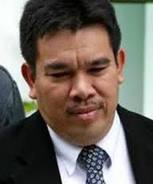
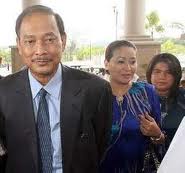
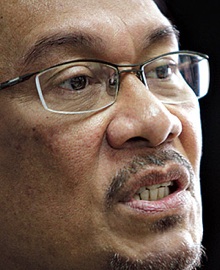


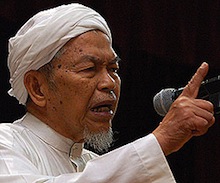
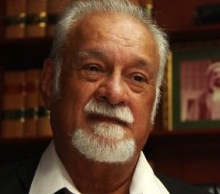
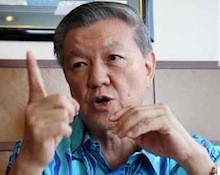

 Prior to this, Opposition Leader Anwar Ibrahim (left) said he was personally in favour of hudud laws being introduced in Kelantan as it would ensure justice.
Prior to this, Opposition Leader Anwar Ibrahim (left) said he was personally in favour of hudud laws being introduced in Kelantan as it would ensure justice.